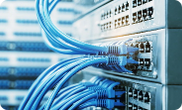Hospital Data Centers: Challenges On the Way to a Better Future
Healthcare data systems are very complicated because they have to deal with the demandable working environments of hospitals. Medical staff and hospital administration need direct access to the multitude of services at any given moment, including things like Electronic Health Records (EHRs). Thus, medical data centers need sophisticated analytical tools that forecast staffing needs weeks ahead. Technologies aid hospitals in improving the quality of healthcare by improving staff coordination.

Physical Data Hubs vs. The Cloud
As of 2020, hospitals use both physical data centers and the cloud, and there are benefits to both of these. Physical hubs that are located on the campus of a clinic usually have a superior performance speed that is useful for collecting medical imaging. What is more, physical data hubs are important for medical establishments that use their own legacy apps. These applications are outdated and are considered a weak point in healthcare organizations because they make hospital servers prone to cyber-attacks. Still, because of underfinancing, many hospitals have to deal with these applications, and this when a physical data center comes in handy.
Cloud systems likely represent the future for hospital data, but there are many challenges when trying to rebuild technologies within American hospitals. Very often, the staff is not ready to choose cloud solutions over physical data centers because there is a lot of confusion about what it would entail. Yet, the cloud is a flexible and scalable choice that is adopted for the contemporary demands of the medical business.
When hospitals invest in traditional physical data centers, they have to play the game of guessing their physical storage needs for years to come. Many hospital managers report having issues with the size of their physical data centers. With the cloud, they can buy the space they need at the moment and upgrade any time their demands change. This makes for more realistic data-planning practices that the hospitals can stick to without sacrificing their finances and resources that are left unused in case physical data centers are inefficient. What is more, the equipment in physical data centers often wears off, which requires re-investment that many hospitals do not have.
Factors to Consider When Switching to the Cloud
The cloud may appear to be a perfect solution to the issues that come with physical data centers. Nevertheless, switching to the cloud requires serious preparation. First, hospitals need to choose a legitimate cloud provider to meet all their data needs and are compliant with security demands. Second, they should develop a strategy that would adequately protect them from potential cyberattacks. Data breaching can be a severe concern when switching to cloud computing, and the stories of privacy violations emerge way too often. Almost 50 percent of serious data security breaches are recorded in the medical industry, and personal devices signed to wireless networks is one of the key reasons for that.
Because of safety concerns, cloud providers have to undergo additional certification when working with hospitals. It is critical for the clinics to choose clouds that are HIPAA- and IDC-certified. The other factor to focus on when choosing a provider is whether they offer disaster recovery and backup. The less financing the hospital has, the more likely it is to switch to the cloud. The maintenance of physical data hubs is expensive, whereas cloud services often provide discounts for healthcare organizations. Therefore, standalone medical establishments are likely to begin the process of shifting to the cloud much faster.
What Do Providers Have to Offer?
Several trusted companies on the market offer specific cloud solutions for hospitals and healthcare organizations in general, including competing cloud providers Microsoft Azure and AWS. Their services are certified according to the standards of medical data centers. Microsoft Azure offers connecting health data from multiple sources into a single cloud. The company's IoT technology offers extra security for clinical operations. Azure's cloud stores patient data in FHIR format that is compatible with major frontline apps. The cloud provider also offers extra enterprise analytical tools. AWS Healthcare Competency Partners also offer effective ways to store clinical data. AWS creates personal clinical data cloud solutions for clinical information systems, health analytics, health administrations, and compliance services.
Lesser-known companies also provide cloud solutions for hospitals. There are cloud services on the market that are designed only with hospitals and other medical establishments in mind. Some companies offer hospitals help with improving the efficiency of their data centers. Services include improving airflow, removing underused cables, and improving the use of the floor space.
Hybrid Solutions: Looking Forward
Some healthcare executives are skeptical about the future of physical data centers, forecasting a complete switch to cloud technologies, even if they have been successfully in charge of physical data centers for decades. Their radical stance on it has some truth to it, but the actual future may not indeed entail the end of physical data centers.
Perhaps, the best strategy for hospitals in the 2020s is a hybrid solution that combines a personal physical data center for essentials and connecting infrastructure to the cloud, and the cloud for everything else. Such a choice allows getting the best of both worlds while significantly saving the costs. There is also an additional layer of flexibility that comes with hybrid solutions. For instance, a hospital can put some files to long term-cloud storage in case they are not needed immediately. If these files are suddenly required on a day-to-day basis, they can be shifted back to physical premises. In the end, the specific needs of a particular healthcare organization are what matters when deciding on the right data solutions. In the future, more sophisticated analytical tools will be there to support personalized medicine, both in the physical data hubs and the cloud.
What About the Cabling?
Cabling solutions in the hospital's physical data hubs vary greatly. Some clinics rely on their own fiber-optic networks. However, the reality is that fiber is often a solution too expensive for medical establishments. Fiber to the office (FTTO) networks that combine fiber cables and copper cords is considered to be the best solution by many hospitals because it is a great compromise with many benefits to it. FTTO networks are secure, scalable, and flexible. Not less important is the fact that such networks have a long life cycle, and are relatively inexpensive in terms of maintenance.
Cabling solutions in both copper and fiber for hospital data centers can be purchased from Nassau National Cable. Among other suitable wires, we offer THHN THWN-2, Tray Cables, and Type W cables that are fully certified and ready to use in hospital data hubs.
COVID-19: An Unforeseen Obstacle To Overcome
The efficiency of hospital data centers is crucial in times of COVID-19 epidemics. Effective maintenance of data in hospitals is needed to report the statistics to the U.S. Department of Health and Human Services. The White House requires all testing facilities to report testing results at 5 p.m. ET to update the information on time and reach accordingly. Moreover, hospitals need powerful tools to ensure adequate staff maintenance in these trying times. Some hospitals that rely only on physical data centers may have outdated hardware or software that prevents them from effectively managing technologies that aid in dealing with the COVID-19 epidemic. Some servers may be too weak to keep up with the growing pressure in the face of pandemics. Power failover redundancy and temperature control are crucial in keeping data centers going under such enormous pressure.
Tech giants step in to help with the outbreak of the epidemics. In the United Kingdom, Microsoft announced its support of the National Health Service's initiative to create a centralized data source. Microsoft will partner with other tech companies like Google and Amazon on this initiative. Some of the expected results are the fast delivery of ventilators to the hospitals before they become overpacked.
What is more, hospital data centers can face staff shortages because of the growing number of specialists that have to be isolated or hospitalized because of the pandemic. There is a risk of skills shortage among those set to replace the staff affected by COVID-19. The latter issue is, however, not exclusive to hospitals' data centers. Data hubs of cloud providers face issues related to coronavirus pandemics as well. In the next blog, we will focus more on the general issues faced by data centers in the face of global pandemics and the economic turmoil caused by it.


















